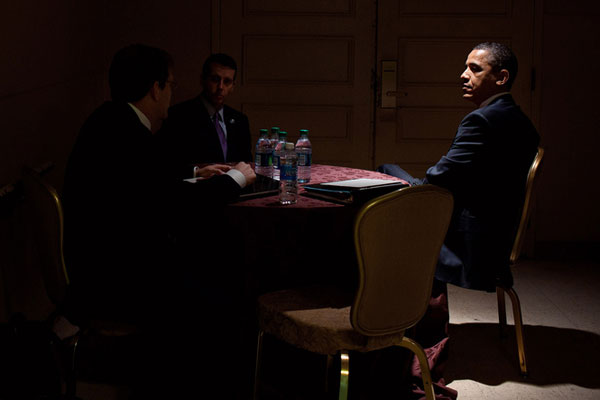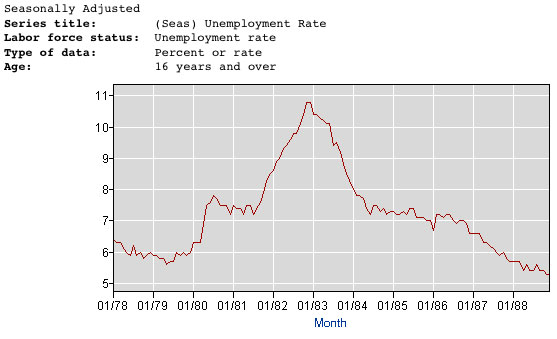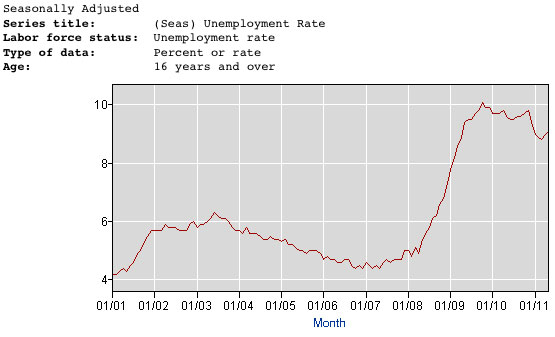
Jay Carney, David Plouffe, Barack Obama
David Plouffe, who managed Barack Obama’s 2008 campaign, "previewed the arguments the president and his team will sound 16 months before an election" for Bloomberg. It’s going to be a long 16 months:
“The average American does not view the economy through the prism of GDP or unemployment rates or even monthly jobs numbers,” Plouffe said. “People won’t vote based on the unemployment rate, they’re going to vote based on: ‘How do I feel about my own situation? Do I believe the president makes decisions based on me and my family?’”
One way you could look at this is that it’s insulting: signaling to the "average American" that he or she doesn’t care about confounding statistics like the "unemployment rate" or "how many people are losing their jobs this month." Average Americans might not care about, I dunno, the Case-Shiller Index, but to say they don’t care about the unemployment rate isn’t giving Joe Statistical Median much credit.
Like, none:
"Poll: Unemployment is Americans’ top economic concern" (March 2009)
"Poll: Cutting unemployment is more important than cutting deficit" (July 2010)
"Poll: Unemployment trumps the economy" (February 2011)
[Update: Great graphic by the Boston Globe on what citizens were asking the President during the Twitter town hall versus what journalists were asking. Via MSNBC, where they were talking about it as a "disconnect" between what the media cares about and what the unwashed masses care about. I don’t think that’s necessarily true, since journalists, especially White House reporters, are obligated to pay attention to process; it’s how we know what politicians are doing or not doing to represent our interests. Not to mention that they’re also a medium by which politicians communicate to each other. But still: one more data point for jobs.]
Another way you could look at it, and it’s not mutually exclusive, is that what Plouffe is saying doesn’t make any sense, beyond the fact that it’s not reflected in polling. It’s like saying "Americans don’t care about airline safety data, they only care if they’re hurtling towards the earth in a ball of flame." The Obama campaign is welcome to go ask everyone about their own situation, but the unemployment rate is not a bad measure if they don’t have the resources.
And that’s another weird thing: How do I feel about my own situation? Do I believe the president makes decisions based on me and my family?
Personally? Since you asked, I’m fine for right now. I’m employed and my wife is employed in jobs we wanted in the city of our choice; we have insurance; we can pay our bills; our immediate family members can mostly say the same thing.
Do I believe the president makes decisions based on us? Broadly speaking, sure. But I’m in an advertising-based industry; the more other people aren’t doing fine right now, the more I think I’m going to be out of a job. My wife works for a non-profit that’s reliant on state funding, serving clients who often end up in her office due to the indirect effects of unemployment, poverty, and economic distress.
Do I want the president making decisions based on us? Well, if he wants to, he can make decisions based on the other people whose situation effects us. In bad economic times, people aren’t just myopically obsessed with their own lot, or lack thereof; they’re also focused about the obvious network effects of economic crisis.
But they have a plan:
He said the president will have to work harder for important “focus groups,” including Hispanic and suburban voters.
The Bloomberg piece mentions that the only president to win re-election with an unemployment rate remotely near the one we have now, which was a point lower than 2012 projections, was Ronald Reagan. And it’s not a bad comparison; Reagan’s first term came on the heels of a similarly brutal economic crisis, arguably more complex than the one we face now. So voters might again be willing to cut a first-termer some slack, though it’s worth noting that Reagan shaved 3.6 percent off the unemployment rate—about a third—from the recession’s peak through election day. Without a change in economic momentum, the current administration will be hard-pressed to match that.
It’s also an auspicious historical comparison given Obama’s stated admiration of Reagan. (Here’s Mike Konczal on more Reagan echoes, this time in regards to the current budget negotiations.) But Reagan had something else to run on besides the economy, the existential threat of the Evil Empire, not to mention a historic gift for messaging. Being the Great Focus-Group-Moderator isn’t going to cut it.
Update: FWIW, unemployment during the Carter/Reagan administrations vs. the Bush/Obama administrations:


So it’s not quite a complete picture to say that Reagan won re-election with 7.2 percent unemployment. His campaign went into the heart of the election season with high unemployment, but also obvious momentum towards low unemployment.
Photograph: The White House/Pete Souza


